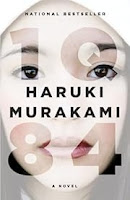If someone were to say, “Haruki Murakami is up to his old tricks,” it would be catnip to millions of readers, and deservedly so. 1Q84 features some of the more celebrated Murakami touches: an alternate universe, many mysteries, some very memorable oddball characters, and multifarious threats, real and supernatural both, which keep both readers and characters on edge. Fortunately, Murakami’s clever presentation, his plain language, and mainly, his conception of this outré story all contribute to a memorably rewarding whole.
Tengo Kawana and Masami Aomame were classmates in elementary school almost 25 years ago. Each must fight the effects of a toxic home life featuring strict, overbearing parents and the cult-like demands that are imposed in each household. As children they find each other alone in a classroom while everyone else is out playing in the schoolyard. Aomame, which is the name the little girl eventually goes by, grabs and holds Tengo’s — the little boy’s — hand briefly, tightly, and as it turns out, unforgettably. For the remainder of the book’s 1,000 pages, we try to learn whether they can find each other again after all these years and strange events.
This book covers themes of sexual abuse (not directly depicted); mainstream but debilitating religious cults; poor parenting, which manages to be both abusive and neglectful at the same time; love, done in a quirky and unique way; and how people are judged by their appearance. He sets these challenges before his characters, and one can tease out the author’s position on these issues by how the characters fare.
I didn’t object as much as some critics to the book’s length. Some felt too much of the book contained no events worth considering, but I thought the tame language, the plodding, matter-of-fact nuts and bolts of a detective’s investigation, were interesting, and made me comfortable, and appreciate the author’s point of view as I hadn’t before. The tension during this exposition comes from an ill-defined set of supernatural beings called the Little People, who threaten an ill-defined cataclysm should Aomame and Tengo escape back to the real world.
Overall, 1Q84 proves Murakami’s inventiveness, as though any further proof could ever be needed. He lulls his readers into a sense ease at times, even though he has established that virtually his entire novel depicts supernatural and impossible features. The “story within a story within a story” effect wilts a little as the long dry passages parch it and make it pale, but this is still a rewarding book. I don’t, however, recommend it as highly as Hard Boiled Wonderland and the End of the World, or Kafka on the Shore.
I have not read an opinion on whether 1Q84 makes any kind of statement or reference to George Orwell’s classic 1984. Orwell takes modern cult politics and shoves it through a prism to point out its cruelty and absurdity. This does not strike me as something that Murakami was trying to emulate, repeat, or interpret here. Someone with more time to treat it might be more able to address it fully.
















